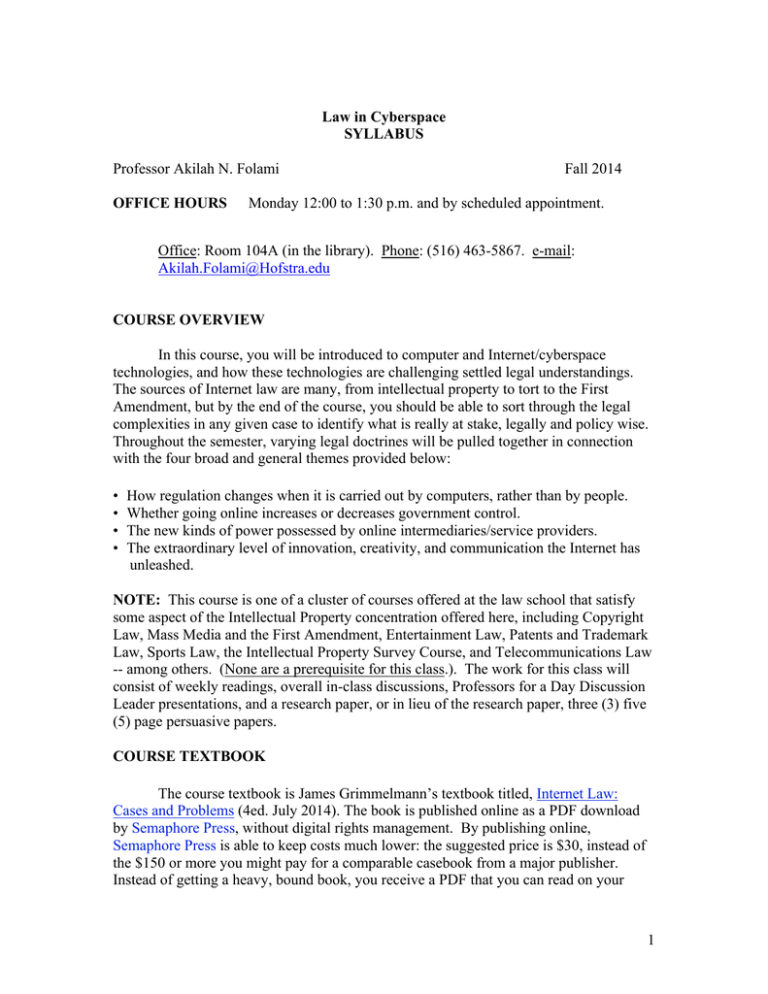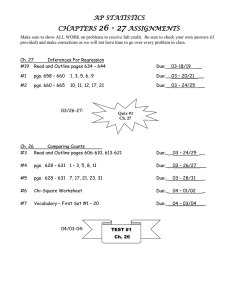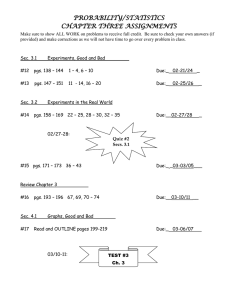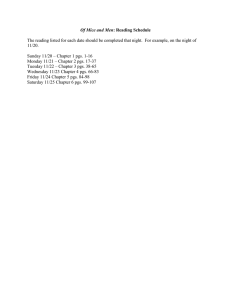Professor Akilah N. Folami Fall 2014
advertisement

Law in Cyberspace SYLLABUS Professor Akilah N. Folami OFFICE HOURS Fall 2014 Monday 12:00 to 1:30 p.m. and by scheduled appointment. Office: Room 104A (in the library). Phone: (516) 463-5867. e-mail: Akilah.Folami@Hofstra.edu COURSE OVERVIEW In this course, you will be introduced to computer and Internet/cyberspace technologies, and how these technologies are challenging settled legal understandings. The sources of Internet law are many, from intellectual property to tort to the First Amendment, but by the end of the course, you should be able to sort through the legal complexities in any given case to identify what is really at stake, legally and policy wise. Throughout the semester, varying legal doctrines will be pulled together in connection with the four broad and general themes provided below: • • • • How regulation changes when it is carried out by computers, rather than by people. Whether going online increases or decreases government control. The new kinds of power possessed by online intermediaries/service providers. The extraordinary level of innovation, creativity, and communication the Internet has unleashed. NOTE: This course is one of a cluster of courses offered at the law school that satisfy some aspect of the Intellectual Property concentration offered here, including Copyright Law, Mass Media and the First Amendment, Entertainment Law, Patents and Trademark Law, Sports Law, the Intellectual Property Survey Course, and Telecommunications Law -- among others. (None are a prerequisite for this class.). The work for this class will consist of weekly readings, overall in-class discussions, Professors for a Day Discussion Leader presentations, and a research paper, or in lieu of the research paper, three (3) five (5) page persuasive papers. COURSE TEXTBOOK The course textbook is James Grimmelmann’s textbook titled, Internet Law: Cases and Problems (4ed. July 2014). The book is published online as a PDF download by Semaphore Press, without digital rights management. By publishing online, Semaphore Press is able to keep costs much lower: the suggested price is $30, instead of the $150 or more you might pay for a comparable casebook from a major publisher. Instead of getting a heavy, bound book, you receive a PDF that you can read on your 1 computer, iPad/tablet, or smartphone. You can print out as much, or as little, as you need. If the copy you printed is damaged, you can print the missing pages again, as often as you need. NOTE: Be sure to print and bring with you to class a hard copy of the pages assigned and due for that class period, as computers, iPads/tablets, and/or smartphones are NOT permitted to be used in class. ATTENDANCE, TARDINESS, CLASS PARTICIPATION, AND ASSIGNMENTS Attendance: This is not a lecture class, but a class based on discussion and the exchange of ideas. Accordingly, students are expected to attend every class, and to be on time for every class. Each class will begin promptly. The rules of the New York State Court of Appeals and the American Bar Association require law students to be in good and regular attendance in the courses for which they are registered. To comply with these rules, you must attend at least 85% of the regularly-scheduled classes in this course. Thus, you may not have more than two (2) absences of this class. I will provide sign-in sheets for each regularly-scheduled class, which shall be the dispositive evidence regarding your absence from a given class. Each student is responsible for signing in. Falsification of sign-in sheets is a violation of the Code of Academic Conduct. If you exceed the permitted absences by failing to sign in, you may be administratively withdrawn from the course. No prior notice may be given, and you may receive notification from the Office of Academic Records indicating the withdrawal. Any such withdrawal may have serious ramifications for your financial aid, academic standing, and date of graduation. If you are excessively absent from several classes, you may face additional sanctions, including but not limited to denial of certification of good and regular attendance to the New York State Board of Law Examiners, or other state bar examiners. NOTE: You are responsible for keeping track of your own absences and for notifying the Office of Student Affairs, as soon as possible, if you believe you must be absent from class for more than the permitted number of classes. Accommodations may be made for students who must be absent for religious reasons and in cases of truly compelling hardship. Any request for an exception must be accompanied with appropriate documentation and must otherwise be satisfactory to OSA’s criteria for excusing absences. Tardiness: I will circulate the sign-in sheet at the beginning of each class. If you are not present at that time, you will be marked absent. If you are unreasonably late, please see me at the end of class and before I leave the classroom to ask me to change 2 your absence mark to a tardy mark. For purposes of this policy, two tardies may affect your class participation grade and/or may be counted as one absence. Class Participation and Professors for a Day Discussion Leaders: For more detailed information regarding class participation, please read the memo “Guidelines for Writing Assignments and Class Participation” that I have prepared for this class and uploaded on this course’s TWEN site titled, The Law of Cyberspace, in the Course Materials link. I provide a bit more information below: With regard to general class participation: Again, this is not a lecture class. Although I expect to deliver some lectures, the bulk of the class will consist of discussion and active participation on your part. I will also call on students randomly. Having students who are prepared will make for a much more interesting class for all of the students. Students who are unprepared more than once will have this counted against their final grade. In addition, while each student is to read and be prepared for class, two students will serve as discussion leaders for designated classes. Notwithstanding the discussion leaders, all students are expected to have read and to be prepared for each class. NOTE: The questions in the casebook are meant to walk you through the readings. Reading closely enough should enable you to give at least a tentative answer to all of them. These questions will typically serve as a starting point for class discussion. The casebook also contains a number of longer “problems.” Most of them are based on actual cases or stories from the news, but with the details tweaked. Quite often, we will discuss the problems in depth in class; I (and the Professors for the Day) expect you to have thought through them in detail in the event they are discussed. With regard to Professors for a Day Discussion Leader presentations, you will need to sign up on the sign in sheets posted on TWEN for the reading assignment upon which you would like to serve as discussion leader. Students will present in groups of two (or three)—selecting partners voluntarily. Student selection presentation date is on a first come first basis. Writing Assignments: Students have the option of writing a fifteen (15) page research paper (fulfilling the Writing I requirement); or, writing three (3) five (5) page persuasive papers each over the course of the semester (fulfilling the Writing II requirement). Unexcused papers may not be accepted. NOTE: To the extent an unexcused late paper is accepted, which shall be at my sole discretion, it will be subject to ½ a grade deduction for each 12hr of lateness and, therefore, deducted a full grade for a 24 hr lateness, and a full grade and a ½ for a 36 hr lateness, etc. For more detailed information regarding written assignments, please read the memo “Guidelines for Writing Assignments and Class Participation” that I have prepared for this class and uploaded on this course’s TWEN site titled, The Law of Cyberspace, in the Course Materials link. I provide a bit more information below: 3 (1) Research Paper Option: There are three formal submission deadlines should you decide to choose this option: the topic submission, draft submission, and final paper submission, the last of which will entitle you to receiving Writing I credit if it receives a satisfactory passing grade (B or above). The due dates and the grade allocations for the draft and final research paper are set forth in the chart attached to this syllabus. (2) Persuasive Paper Option: Satisfactory completion of all three (3) persuasive papers combined (B or above) will entitle you to receiving Writing II credit. The due dates and the grade allocations for each paper are set forth in the chart attached to this syllabus. NOTE: Students who have taken (or are currently taking) Mass Media and the First Amendment with me will not be permitted to serve as discussion leaders or submit persuasive papers for the reading assignments in this class covering the material on speech and copyright or any other material that was covered in that class. If you are otherwise in doubt about whether a particular reading assignment fits within this restriction, please see me. GRADING POLICY Final Class Grade: Your grade will be based upon the score that you earn on either your persuasive paper or your research paper, and upon your classroom participation (which incorporates your grade for the Professors for a Day presentations and accompanying materials). Subject to my discretion, grades may be adjusted up to account for consistent and exceptional class participation, or down to account for repeated absences or failure to be properly prepared or engaged in class discussion. ASSIGNMENTS Depending on the topic, we will read and discuss 30 to 45 pages each class session. I reserve the right to change and adjust this outline and the assignments based on the pace and progress of the class, the topics of particular interest to the class, and otherwise, as I deem necessary. Any changes will be announced in class, posted on TWEN, and/or emailed to you via the email address you have provided on TWEN. (August 25th) --Introduction (Theory and Computers) => (pgs. 43-59) --Jurisdiction: Cyberspace The Internet => (pgs. 61-77) (September 1st) --NO CLASS (Holiday) (September 8th) 4 --Law on a Global Internet => (pgs. 78-93) --Online Borders => (pgs. 94-104) --Speech Introduction => (pgs. 122-140) (September 15th) --Harmful Speech => (pgs. 141-157) --Indecent/Pornographic Speech => (pgs. 157-171) --Filtered Speech => (pgs. 172-181) (September 22nd) --47 U.S.C. Section 230 and Liability => (pgs. 182-204) --Privacy: Introduction => (pgs. 205-232) (September 29th) --Privacy: Wiretapping & National Security => (pgs. 233-249, 250-275) --Privacy: Anonymity => (pgs. 279-295) --Privacy: Consumer Privacy => (pgs. 296-316) (October 6th) --Social Media and Litigation => (pgs. 317-326) --Computer Access: Contracts => (pgs. 327-340) --Computer Access: Misuse => (pgs. 341-357) (October 13th) --Trademarks: Intro => (pgs. 371-392) --Trademark: Domain Names => (pgs. 393-407) (October 20th) --Trademark: Virtual Property => (pgs. 417-446) --Copyright: Exclusive Rights => (pgs. 447-465) (October 27th) --Copyright: Licensing => (pgs. 466-485) --Copyright: Fair Use => (pgs. 486-496) (November 3rd) --Copyright: Secondary Liability => (pgs. 497-509) --Copyright: 17 U.S.C. Section 512 => (pgs. 510-531) (November 10th) --Management and Enforcement Advances => (pgs. 532-562) (November 17th) --Private Power: First Amendment => (pgs. 584-596) --Private Power: Antitrust => (pgs. 596-610) 5 (November 24th) --Private Power: Net Neutrality => (pgs. 610-642) (December 1) --TBA 6 7 TOPIC ! Your research paper should be a legal analysis persuasively identifying and addressing any one of the topics assigned or discussed during the semester. You must take a position on the issue and support your position critically and again persuasively. If you would like to choose a topic that is not within the confines of the topics assigned or discussed in this class, you will need my approval in advance. ! DUE DATES NOTE: You may want to peruse the syllabus and assigned reading materials to find a topic of interest to you. ! Your persuasive paper(s) should be a legal analysis persuasively identifying an issue from one of the reading assignments assigned prior to the particular persuasive paper due date, taking a position on that issue, and supporting your position critically and again persuasively. ! Research Papers: ! ! Emailed Topic and due on September 21st at midnight. Draft due on October 24th at midnight. It accounts for 25% of your writing assignment grade. NOTE: Draft of paper should include your argument, thesis, your position and support for your position, and any counter-arguments. Final due on December 1st at midnight. It accounts for 75% of your writing assignment grade Please submit draft and final paper on TWEN in the Assignment Drop Box, Topic and Outline may be emailed to me directly. ! ! ! Persuasive Papers: ! First Persuasive Paper is due on September 21st at midnight. Second Persuasive Paper is due on October 24th at midnight. Third Persuasive Paper is due on December 1st at midnight. ! ! ! The scope of your Persuasive Paper must be selected from one of the reading assignments assigned prior to the particular persuasive paper due date. Please submit on TWEN in the Assignment Drop Box link. Your first persuasive paper is worth 20% of your written assignment grade and the remaining two papers are weighted equally for the remaining 80% of your written assignment grade. 8 ! FORMAT ! ! ! LENGTH For Persuasive and Research Papers: Please use endnotes not footnotes. Bluebook format is highly recommended but not required for your papers. NOTE: Please note that I am not looking for a summary or objective recap on the research paper topic or assigned readings for the persuasive papers but more of a persuasive analysis. Your first or second paragraph of your papers should contain this information in your thesis, boldly, clearly, and concisely. Margins may not be more than one-inch all around. Use a twelve (12) point Times New Roman font. Number all pages, excluding first page of the paper. ! Your research paper should be fifteen (15) pages in length. ! Each of the three (3) persuasive papers should be five (5) pages. NOTE: Any overage or shortage may result in a grade penalization. Basis of Grade for the Final Research Paper and/or Persuasive Papers For final research papers, the grade of the final research paper will be based on its cogency, its coverage of the issues, grounding in law and policy, and of course organization, structure, and its conformity to general rules of grammar. In addition, incorporating relevant analysis will be rewarded higher grades than merely regurgitating previous law review articles. NOTE: For the draft of the final research paper, the grade will be based on your identification of a narrow issue, your preliminary thoughts, positions, and arguments, and your consideration of counter-arguments on that issue and your arguments. For individual persuasive papers, the grade of the persuasive paper will be based on its cogency, its coverage of the assigned readings, the level of reflection and analysis, which may include incorporation of other materials, and of course organization, structure, and its conformity to general rules of grammar. In addition, incorporating relevant analysis and reflection will be rewarded higher grades than merely regurgitating what was assigned in the reading. Again, for more detailed information regarding written assignments, please read the memo “Guidelines for Writing Assignments and Class Participation” that I have 9 prepared for this class and uploaded on this course’s TWEN site titled, The Law of Cyberspace, in the Course Materials link. 10






